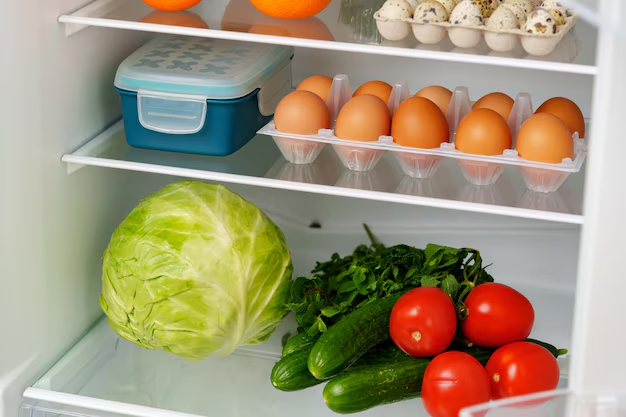The Ultimate Guide to Storing Eggs in Your Refrigerator: Best Practices for Freshness and Safety
When it comes to keeping eggs fresh and safe to eat, where and how you store them in your refrigerator can make a big difference. Many of us may place the carton wherever it fits without giving it much thought, but there's a bit more to egg storage than just convenience. In this guide, we'll dive into the best practices for storing eggs in your refrigerator, ensuring both optimal freshness and safety for your next breakfast or baking spree. 🥚
Why Proper Egg Storage Matters
Eggs are a staple in households around the world. Whether you're whipping up an omelet, baking a cake, or adding that perfect poach to your avocado toast, eggs are the backbone of countless recipes. But improper storage can lead to spoilage and even health risks. Let's explore why proper egg storage is essential.
Freshness
Eggs naturally start to lose their freshness after being laid. Proper refrigeration slows this natural aging process, preserving their taste and texture. Fresh eggs not only taste better but are also more visually appealing, with vibrant yolks and firm whites.
Safety
Eggs can harbor bacteria like Salmonella, which is why storing them properly is crucial for preventing foodborne illnesses. By keeping eggs at a consistent, cold temperature, you minimize the risk of bacterial growth.
Where to Store Eggs in Your Refrigerator
You might be tempted to use the convenient egg caddy built into your refrigerator door, but that's not the best spot. Here's a guide on where your eggs should ideally reside:
The Best Spot: The Main Body of the Refrigerator
Why: Eggs should be kept in the coldest part of the refrigerator to ensure maximum freshness and safety. The temperature fluctuations caused by frequently opening and closing the fridge door can cause eggs to spoil more quickly.
Recommended Practice: Keep your eggs in their original carton on a middle or bottom shelf towards the back.
Benefits of Keeping Eggs in the Original Carton
Protection from Odors: The carton helps protect eggs from absorbing strong odors and flavors from other foods.
Cushion from Bumps: Eggs are delicate, and the carton provides a buffer against potential bumps or knocks.
Date Reminders: Cartons come with expiration dates stamped on them, helping you keep track of freshness.
Alternatives: Dedicated Egg Holders
Some people prefer to transfer eggs to a dedicated egg holder or crisper. While these can be great for organization, always ensure they're kept in the main body and not on the door.
Temperature Considerations for Egg Storage
Maintaining a consistent and appropriate temperature is crucial for ensuring eggs remain safe to consume.
Ideal Temperature
- Refrigerator Temperature: Keep your refrigerator set at or below 40°F (approximately 4°C) to slow bacterial growth and maintain egg freshness.
Monitoring Temperatures
Tip: Consider using a refrigerator thermometer to ensure your appliance is consistently maintaining the correct temperature.
How Long Can You Store Eggs?
Eggs have a longer shelf life than you might think when stored correctly. Here’s a simplified guide:
- Fresh Eggs:
- Typically last about 3–5 weeks in the refrigerator.
- Hard-Boiled Eggs:
- Best consumed within one week of cooking.
Pro Tip: If you're unsure about an egg's freshness, try the float test. Gently place the egg in a bowl of water. Fresh eggs will sink, while older ones will float due to increased air content inside the shell.
Common Questions About Egg Storage
Do Eggs Need to Be Refrigerated?
In many countries, eggs are sold unrefrigerated and don't require refrigeration. However, in locations where eggs are washed (such as the U.S.), refrigeration is essential to slow bacterial growth and maintain safety.
Can You Freeze Eggs?
Yes, eggs can be frozen, but not in their shells. To freeze, simply beat whole eggs and pour them into an airtight container. You can also separate yolks and whites before freezing.
Should I Wash Eggs Before Storing Them?
No, washing eggs is not recommended as it removes the natural protective coating, known as the cuticle, which helps keep bacteria out. If eggs are visibly dirty, consider wiping them gently with a dry cloth.
Summary: Egg Storage Tips 📝
Here's a handy bullet-point summary of key takeaways for optimal egg storage:
- 🥚 Store eggs in the main body of the refrigerator, not in the door.
- 📦 Keep eggs in their original carton to protect from odors and physical damage.
- 🌡️ Ensure a consistent fridge temperature of 40°F (4°C) or less.
- 🕒 Consume eggs within 3–5 weeks of purchase.
- 💧 Use the float test to check egg freshness.
By following these best practices, you can ensure your eggs remain fresh, safe, and ready to support all your culinary endeavors.
Storing eggs correctly in your refrigerator might seem like a small detail, but it plays a big role in maintaining both the quality and safety of this kitchen staple. By paying attention to where and how you store your eggs, you're taking a simple yet effective step towards reducing food waste and maximizing the taste of your dishes. So the next time you whisk up a morning scramble, you'll know those eggs are just as fresh as they should be. 🍳

